| Srl | Item |
| 1 |
ID:
148963
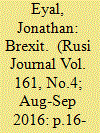

|
|
|
|
|
| Summary/Abstract |
When Britain voted on 23 June 2016 to leave the EU, the referendum result shocked many not only in the UK and its fellow EU member states but across the world. As the dust settles, the questions thrown open by this momentous decision remain. Jonathan Eyal analyses some of the most salient points that are likely to dominate the debate over the months and years ahead.
|
|
|
|
|
|
|
|
|
|
|
|
|
|
|
|
| 2 |
ID:
148962
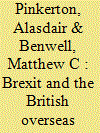

|
|
|
|
|
| Summary/Abstract |
On 23 June 2016 the United Kingdom voted in a referendum to leave the European Union. As well as citizens of the UK, residents of the UK Overseas Territory of Gibraltar were also allowed to vote, with 96 per cent voting Remain. While the exact modes and timings of the UK's exit from the EU remain unclear, the campaign was characterised by increasingly heated debate and sharply contrasting visions for Britain and its relationship with the wider world in the twenty-first century. Matthew C Benwell and Alasdair Pinkerton argue that the UK's 2016 EU referendum campaign and the political and economic evaluations that it has invited have exposed a shifting relationship between the UK and its Overseas Territories (OTs) and demonstrate the role played by the EU in fostering the OTs' political, economic and regional security – a perspective often ignored by the OTs' so-called ‘friends’ and supporters.
|
|
|
|
|
|
|
|
|
|
|
|
|
|
|
|
| 3 |
ID:
148968
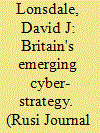

|
|
|
|
|
| Summary/Abstract |
In recent years, cyber-power has attracted a great deal of attention in government strategy and security reviews. This has been matched by regular increases in budget and the establishment of new organisations to co-ordinate UK activity in cyberspace. The result is the emergence of UK cyber-strategy. However, David J Lonsdale argues that at present UK cyber-strategy is not comprehensive, nor does it cohesively bring together the different elements of cyber-power to effectively serve UK policy objectives. Here, he identifies the components of the UK’s emerging cyber-strategy and assesses the UK’s approach against a comprehensive cyber-strategy framework. The latter includes seven elements: defence; cyber-espionage; information manipulation; widespread disruptive attacks; raids; joint operations; and deterrence.
|
|
|
|
|
|
|
|
|
|
|
|
|
|
|
|
| 4 |
ID:
148961
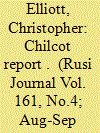

|
|
|
|
|
| Summary/Abstract |
The Report of the Iraq Inquiry (Chilcot Report) was recently published. In this article, Christopher Elliott observes that, while the Chilcot Report has shed light on Britain’s involvement in the conflict, it could have provided a more detailed assessment of the decision-making processes for the UK’s military operations.
|
|
|
|
|
|
|
|
|
|
|
|
|
|
|
|
| 5 |
ID:
148966


|
|
|
|
|
| Summary/Abstract |
Civil–military relations, a subject of enduring concern in the US and a matter of intense debate during the presidential administration of Bill Clinton, have receded in the public mind to a matter of little immediate concern. As such, it is important to determine what tomorrow’s senior military leaders are thinking in this regard. Gregory Foster analyses the views expressed by a number of these future leaders enrolled in a course on civil–military relations at the National Defense University in Washington, DC, providing an insight into the minds of those who will lead tomorrow’s US military.
|
|
|
|
|
|
|
|
|
|
|
|
|
|
|
|
| 6 |
ID:
148970


|
|
|
|
|
| Summary/Abstract |
The Franco–German front along Chemin des Dames was the scene of some of the most destructive and demoralising fighting of the First World War. Nearly 100 years later, the great military historian Richard Holmes, on first reviewing one of Michael St Maur Sheil’s pictures of the battlefield, wrote
|
|
|
|
|
|
|
|
|
|
|
|
|
|
|
|
| 7 |
ID:
148967
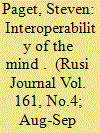

|
|
|
|
|
| Summary/Abstract |
The prevalence of coalition operations has ensured that interoperability between multinational forces is of overarching importance. Although historically interoperability was mainly seen as a matter of technology, Steven Paget argues that cultural interoperability is just as, if not more, significant. Cultural interoperability can be developed in many ways, but exchanges of international students and teachers during the process of professional military education has the potential to redress negative stereotypes, solidify strong existing bonds and enhance interoperability. As a considerable number of international exchange officers at professional military education institutions progress to the highest ranks of their own armed forces, the potential long-term benefits are vast.
|
|
|
|
|
|
|
|
|
|
|
|
|
|
|
|
| 8 |
ID:
148965
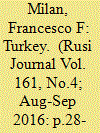

|
|
|
|
|
| Summary/Abstract |
The attempted coup that took place in Turkey on 15 July 2016 was the latest in a long line of military coups in the country’s post-Second World War history. Francesco F Milan looks at the country’s controversial legacy of civil–military relations
|
|
|
|
|
|
|
|
|
|
|
|
|
|
|
|
| 9 |
ID:
148964


|
|
|
|
|
| Summary/Abstract |
Asset freeze requirements are central to most UN Security Council sanctions regimes. In order to ensure proportionality and minimise unintended consequences, certain exemptions are built into the requirements of each regime. In the case of UN sanctions on Iran, the exemptions extended to assets connected with contracts in place before sanctions were imposed. While UN sanctions on Iran were in place, an Iranian financial entity (IFE), otherwise subject to the asset freeze, made payments over several years under such a contract. Payments were received largely on schedule except for a period of about thirteen to fourteen months after the IFE was excluded from the SWIFT (Society for Worldwide Interbank Financial Telecommunication) system. Jonathan Brewer shows how UN asset freeze exemptions worked as intended in this case.
|
|
|
|
|
|
|
|
|
|
|
|
|
|
|
|
| 10 |
ID:
148969


|
|
|
|
|
| Summary/Abstract |
In April 1946, the first post-war course of the Imperial Defence College (IDC) got underway with General Bill Slim as the new commandant. The college had been established during the interwar years to provide an opportunity for senior military officers and civil servants from Britain and the Commonwealth to gain a better understanding of higher strategy and how it was conducted. Andrew Stewart examines Slim’s role in the reopening of the IDC as Britain re-thought its role in international politics. He shows that the students at the college would spend much of their time studying what is now referred to as ‘soft’ and ‘hard’ power, and over the eight months of the course they gained a much better understanding of the influence Britain wielded in the world.
|
|
|
|
|
|
|
|
|
|
|
|
|
|
|
|